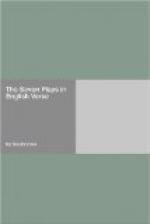The Grecian host abhor me: Troy, with all
This country round our camp, is my sworn foe.
Shall I, across the Aegean sailing home,
Leave these Atridae and their fleet forlorn?
How shall I dare to front my father’s eye?
How will he once endure to look on me,
Denuded of the prize of high renown,
Whose coronal stood sparkling on his brow?
No! ’twere too dreadful. Then shall I advance
Before the Trojan battlements, and there
In single conflict doing valiantly
Last die upon their spears? Nay, for by this
I might perchance make Atreus’ offspring glad.
That may not be imagined. I must find
Some act to let my grey-haired father feel
No heartless recreant once called him sire.
Shame on the wight who when beset with ill
Cares to live on in misery unrelieved.
Can hour outlasting hour make less or more
Of death? Whereby then can it furnish joy?
That mortal weighs for nothing-worth with me,
Whom Hope can comfort with her fruitless fire.
Honour in life or honour in the grave
Befits the noble heart. You hear my will.
CH. From thine own spirit, Aias, all may tell,
That utterance came, and none have prompted thee.
Yet stay thy hurrying thought, and by thy friends
Be ruled to loose this burden from thy mind.
TEC. O my great master! heaviest of all woe
Is theirs whose life is crushed beyond recall.
I, born of one the mightiest of the free
And wealthiest in the Phrygian land, am now
A captive. So Heaven willed, and thy strong arm
Determined. Therefore, since the hour that made
My being one with thine, I breathe for thee;
And I beseech thee by the sacred fire
Of home, and by the sweetness of the night
When from thy captive I became thy bride,
Leave me not guardless to the unworthy touch
And cruel taunting of thine enemies’
For, shouldst thou die and leave us, then shall I
Borne off by Argive violence with thy boy
Eat from that day the bread of slavery.
And some one of our lords shall smite me there
With galling speech: Behold the concubine
Of Aias, first of all the Greeks for might,
How envied once, worn with what service now!
So will they speak; and while my quailing heart
Shall sink beneath its burden, clouds of shame
Will dim thy glory and degrade thy race.
Oh! think but of thy father, left to pine
In doleful age, and let thy mother’s grief—
Who, long bowed down with many a careful year,
Prays oftentimes thou may’st return alive—
O’er awe thee. Yea, and pity thine own
son,
Unsheltered in his boyhood, lorn of thee,
With bitter foes to tend his orphanhood,
Think, O my lord, what sorrow in thy death
Thou send’st on him and me. For I have
nought
To lean to but thy life. My fatherland
Thy spear hath ruined. Fate—not thou—hath
sent
My sire and mother to the home of death
What wealth have I to comfort me for thee?
What land of refuge? Thou art all my stay
Oh, of me too take thought! Shall men have joy,
And not remember? Or shall kindness fade?
Say, can the mind be noble, where the stream
Of gratitude is withered from the spring?




